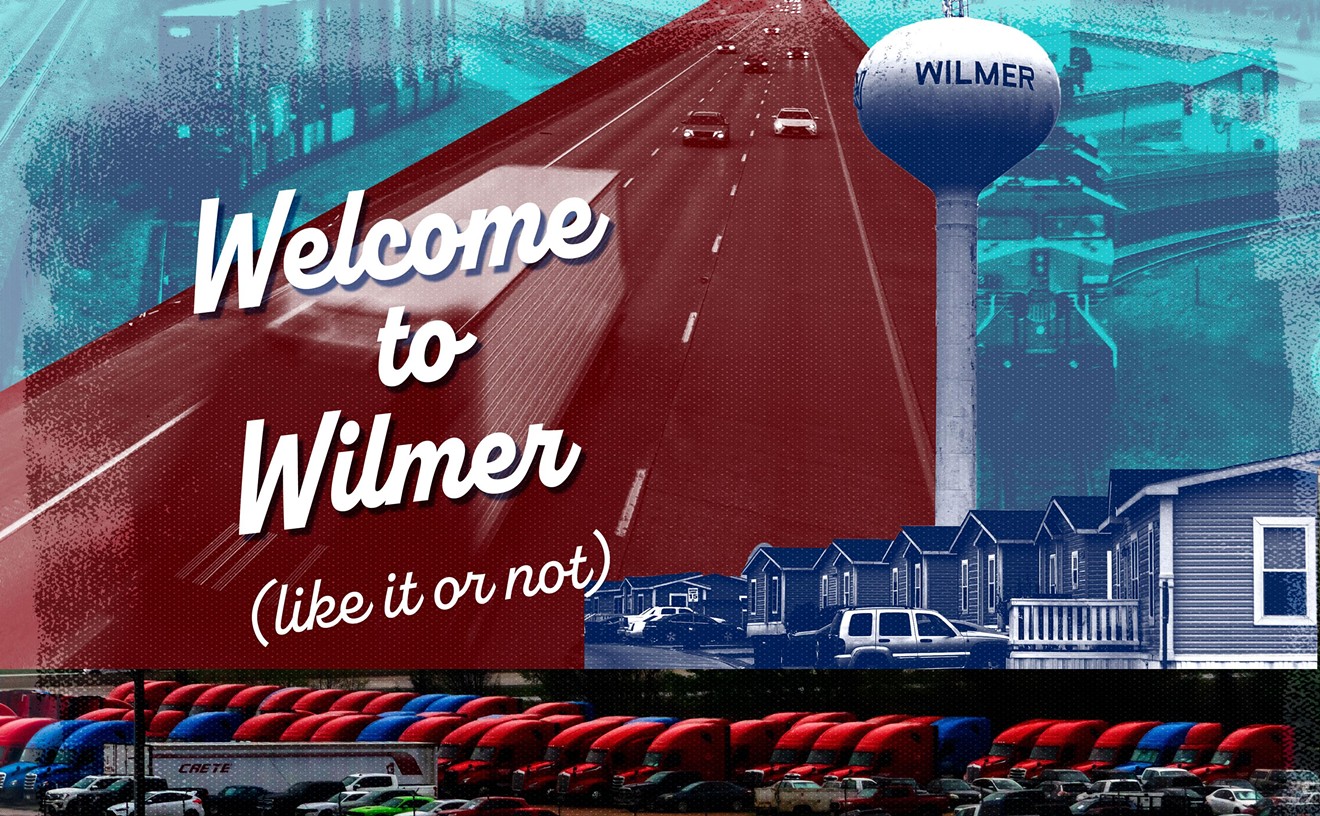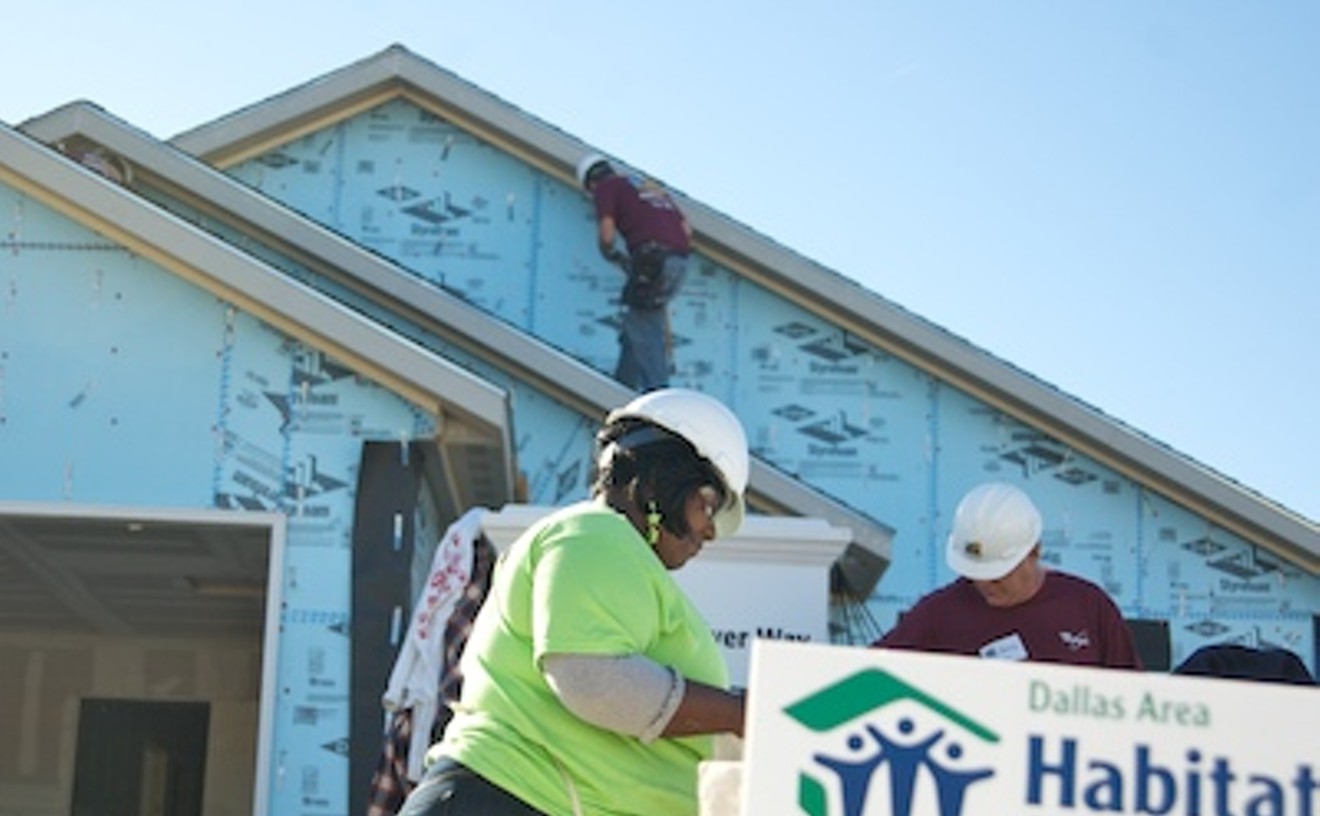As I hike down from the high embankment of the levee and out of the Great Trinity Forest, rain and dusk pushing me on, not to mention mosquitoes, I find two cop cars waiting for me on the tarmac below—a discovery that does not surprise. In fact it warms my heart a bit.
The parking lot where I'd left my car, after all, is just outside Turner Courts, a public housing complex in the Bon Ton area near Rochester Park at the bottom of Old South Dallas, a district long bedeviled by drugs and crime. And right now it's getting dark.
One cop has his window rolled down waiting for me to walk over to him. He wonders—I gauge all of this by his facial expression—if I stole the car, if I am trying to get the car stolen, if I have been out there in the woods burying somebody or, judging by my wet mud-streaked mien, if I recently have been disinterred myself.
"Hi," I say.
He stares. He's a white guy, short blond hair, maybe 32 years old.
"What are you doing?"
"I was out hiking on the Buckeye Trail," I say.
He stares, waiting for me to make sense.
I know, of course, that my statement is neither simple nor innocent. I'm an old white guy in nylon rain pants with hiking poles. I might as well be Rollerblading through Turner Courts in a Speedo with a martini in one hand and a parasol in the other.
My statement is a test. The city says this area, long a disused dumping ground and floodway inhabited by snakes, insects and meth cooks, is now a vast urban forest and park area. So great. Here I am in my dorky little white convertible and my Sierra Designs trekking togs on an April evening—out for a damn hike, you sons of bitches.
If it's a park, OK, I'm here to do park things. I mean, what the hell? Is the city going to put up signs that say, "Caution: Some people who enter this park may be killed for their watches"?
"Is that your car?" asks the cop.
"Yes."
He looks me up and down, eyes unblinking.
"What is your last name?"
I tell him.
"Do you know where you are?"
Oh, great. Next he's going to ask me what month it is and who's the president of the United States. Maybe I should get used to this. In a few more years this is how people will greet me.
"Yes," I say.
He cranes around with a certain look. He wants to say, "Planet Earth, right?" But instead he says, "OK." Very much in the tone of, "OK, it's your funeral." But he doesn't say that, either.
I say, "Thank you." And I mean it.
Both cops watch while I pack up. I can't quite get the nylon rain pants off over my muddy hiking boots, so I wind up holding the ankle of my right leg in both hands doing a little flapping, one-legged hop-scotch around the open trunk of the car for a while.
They stare. Not a crack of a smile. They just want me the hell out of here.
This was my second afternoon of adventure in the "Great Trinity Forest." My outing on the day before ended in a very similar fashion. I emerged from a different portion of the forest to find a private security person parked next to my car with his window rolled down staring at me as if I had just floated to Earth with an umbrella for a parachute.
On that afternoon I also said, "Hi."
He also said, "What are you doing?"
I said, "Hiking."
He began to pull away slowly, the tires of his oversized pick-up sputtering on the gravel. "I was wondering," he said.
Ah, wonder. Isn't that what nature is supposed to do for us all?
The Dallas Morning News ran a story April 7 under the headline, "Nature Center, other projects blooming in Great Trinity Forest." The first line was, "Note to hikers and bikers, birders and boaters: The pace is picking up in the Great Trinity Forest."
So, fine. I dug out my hiking boots and my poles and even my special blue water bladder and decided to put the Great Trinity Forest to my own personal test. My wife won't be seen with me with the blue water bladder, which she says looks like an enema bag. Well, you know what? She wasn't invited.
The "Great Trinity Forest" has always been more of a concept than a reality. We're really talking about 6,000 acres of floodway along the reaches of the Trinity River through poor, sometimes very tough areas in the southern half of the city. Much of it was cleared for farmland in the late 19th and early 20th centuries, then in many places developed as neighborhoods. Most of the area was abandoned and allowed to "return to nature" within the last 40 years.
Although groves of hardwood forest occur in the area, the larger share of the land is second or third growth dominated by invasive species such as Chinese privet, considered an aggressive weed in much of the Southern United States.
Even the name, "Great Trinity Forest," is of fairly recent and somewhat disingenuous origin. I spoke with Jeanie Fritz, wife of Ned Fritz, the dean of Texas naturalists, who remembered that the name was dreamed up 10 to 15 years ago by environmentalists as a political ploy.
"The thinking was that, if we could name it, that would be more of an incentive to preserve it," she said.
If the greens hadn't "saved" the area, the U.S. Army Corps of Engineers would have clear-cut it, then paved and graded it to create a broad smooth drain for the river, designed to move flood waters efficiently out of the city.
The greens won that one. The area was preserved from "channelization," the term for what the Corps does if you let them. But then more recently and in a great irony, the name, Great Trinity Forest, was adopted more or less whole-cloth by the other side, The Dallas Morning News and the public works lobby pushing for the Trinity River Project. Even though the project, in their view, was mainly about roads, bridges and levees, they seized on the concept of a vast, forested park in the southern half of the city as a selling point to overcome environmental objections to the plan itself.
They won that one. The plan won. It survived last year's referendum to kill a major toll road through the center of a manicured urban park downtown. Now, downriver from there, we're supposed to have this forest—in fact, a forest in which we can hike. And the Morning News says we already almost do.
Last week on one of my forays, I hiked in to try to get a look at the Trinity River Audubon Center, a $14 million nature center being built by the city. I was within 30 yards when two guys in hard hats came scurrying out to the edge of the construction clearing to ask me who the hell I was—a familiar experience for the Great Trinity Forest hiker, I found.
I said, "Hi."
The nature center, which will be operated by the Audubon Society, is already an imposing presence, prow-shaped, like a ship sailing on a sea of green. After I had evaded the settlers and was safe again beneath the cover of the invasive foliage, I spied out from between the leaves, pursing my lips silently to sip from the tube of my blue water bladder, gazing at this mighty structure arising from what was once a noxious landfill.
I felt a moment of awe in spite of myself. This place when it opens will provide the opportunity we lost when the Dallas Cowboys decided not to build their new football stadium at Fair Park in South Dallas. The Audubon Center will provide a hard physical linkage between the two mutually foreign spheres of our long benighted city, drawing north into south and thereby tying the two together in some small way.
The Great Trinity Forest is really the Great Trinity Metaphor for all of the city's hopes and fears, the whole catalog, everything from snakes to race. Only by treading the same ground can the two halves ever be bound together. And when everybody does start treading, I highly recommend one of these blue water bladders.
In places the trees were thin and the grasses rose to my hips and even shoulders. I thrashed ahead with walking sticks, announcing myself to all crawling things of the Earth. The flying insects were knocked back a bit by a brief cool spell...but only a bit. I imagine during much of the year it's going to be like my native climes in Northern Michigan: If you want to survive out there you'll have to go dressed as a beekeeper.
And here's the point. All of a sudden, very unexpectedly after wandering without a hint of path or trail, I came across a lovely little jewel of a pond, silent beneath caressing branches. Somewhere in our city.
The Morning News is crazy. The forest park isn't even close yet. It's going to cost us 10 hundred kabillion dollars to make it safe or even remotely plausible for people to park their cars and wander around out there with their families.
The whole forest thing was a scam by the people pushing the road project. Before that, the whole forest thing was a scam by the people resisting the road project.
And it's going to be wonderful. In fact the whole forest thing is perfect. It's the best possible enterprise we could be spending our money and our time on: the creation of a municipal soul.
Isn't democracy brilliant?











